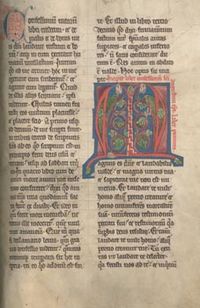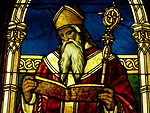- Confessions (St. Augustine)
-
The Confessions of St. Augustine 
Author(s) St. Augustine Confessions (Latin: Confessiones) is the name of an autobiographical work, consisting of 13 books, by St. Augustine of Hippo, written between AD 397 and AD 398. Modern English translations of it are sometimes published under the title The Confessions of St. Augustine in order to distinguish the book from other books with similar titles.
Contents
Summary
The work outlines Augustine's sinful youth and his conversion to Christianity. It is widely seen as the first Western autobiography ever written, and was an influential model for Christian writers throughout the following 1000 years of the Middle Ages. It is not a complete autobiography, as it was written in his early 40s, and he lived long afterwards, producing another important work (City of God); it does, nonetheless, provide an unbroken record of his development of thought and is the most complete record of any single person from the 4th and 5th centuries. It is a significant theological work. In the work St. Augustine writes about how much he regrets having led a sinful and immoral life. He discusses his regrets for following the Manichaean religion and believing in astrology. He writes about Nebridius's role in helping to persuade him that astrology was not only incorrect but evil, and St. Ambrose's role in his conversion to Christianity. He shows intense sorrow for his sexual sins, and writes on the importance of sexual morality. The book is thought to be divisible into chapters which symbolize various aspects of the Trinity and trinitarian belief.
Outline (by Book)

Part of a series on St. Augustine
of HippoMain topics Original sin · Divine grace
Invisible church · Time
Predestination · Infant baptism
Incurvatus in se
Allegorical interpretation
Amillennialism
Augustinian hypothesis
Just WarWorks The City of God
Confessions
On Christian Doctrine
Soliloquies
EnchiridionInfluences and followers Plotinus · St. Monica
Ambrose · Possidius
Hugh of Saint Victor · Thomas Aquinas
Bonaventure · Luther
Calvin · JansenRelated topics Neoplatonism · Pelagianism
Augustinians · Scholasticism
Jansenism
Order of St. Augustine- His infancy and boyhood up to age 14. He speaks of his inability to remember the sins he almost certainly committed during this time. Children serve as insight into what man would be if it weren't for being socialized into waiting one's turn. God teaches us to think of others before we think of ourselves, unlike children who cry until they are fed.
- Augustine finds himself amongst bad companions, which leads him to commit theft and succumb to lust. Augustine comes from a good family and has never wanted for food. In this chapter, he explores the question of why he and his friends stole pears when he had many better pears of his own. He explains the feelings he experienced as he ate the pears and threw the rest away to the pigs. Augustine argues that he most likely would not have stolen anything had he not been in the company of others who could share in his sin. Some insight into group mentality is given.
- His studies at Carthage, his conversion to Manichaeism and continued indulgences in lust between 16 and 19.
- His loss of a friend and his studies in Aristotle and the fit and the fair between 20 and 29. Augustine is overcome with grief after his friend dies in his absence. Things he used to love become hateful to him because everything reminds him of what was lost. He concludes that any time one loves something not in God, one is bound to feel such loss. Augustine then suggests that he began to love his life of sorrow more than his fallen friend.
- His movement away from Manichaeism under the influence of St. Ambrose in Milan at 29. Augustine begins to understand that things said simply can be true, while things put eloquently may be lacking in substance. He is unimpressed with the substance of Manichaeism, but has not yet found something to replace it. He feels a sense of resigned acceptance to these fables as he has not yet formed a spiritual core to prove their falsity.
- His movement towards Christianity under the influence of St. Ambrose at 30. He is taken aback by Ambrose's kindness but still does not understand the substance of his teachings.
- His rejection of Manichee dualism and the Neoplatonist view of God at 31. He struggles to create his own views on God which moves him towards a better understanding of God.
- His continued inner turmoil on whether to convert to Christianity at 32. Two of his friends Simplicianus and Ponticianus tell Augustine stories about others converting. While reflecting in a garden, he hears a child's voice chanting "take and read." Augustine picks up a Bible and reads the passage it opens to, Romans 13:13-14. His friend Alypius follows his example. Finally, Augustine decides to convert to Christianity.
- His baptism done by Ambrose at 33, the death of his mother Monica, the death of his friends Nebridius and Vecundus, and his abandonment of his studies of rhetoric.
- Continued reflections on the values of confessions and on the workings of memory, as related to the five senses.
- Reflections on Genesis and searching for the meaning of time.
- Continued reflections on the book of Genesis. Augustine especially focuses on the language used to tell the creation story.
- Exploration of the meaning of Genesis and the Trinity.
See also
- Imitation of Christ
- Soliloquies of Augustine
References
- Chadwick, Henry (2008). Saint Augustine: Confessions. Oxford: Oxford University Press. ISBN 0-199-53782-8. (Translation into English)
- Warner, Rex (1963). The Confessions of St. Augustine. New York: Penguin Books. ISBN 0-451-62474-2. (Translation into English)
External links
- Text in Latin with commentary by James J. O'Donnell
- Augustine: Texts and Translations
English Translations
- at Christian Classics, trans. Albert C. Outler (Philadelphia: Westminster Press, 1955).
- at New Advent, trans. J.G. Pilkington (Edinburgh: T. & T. Clark, 1886).
- at Georgetown, trans. E.B. Pusey (Oxford : J.H. Parker; London: J.G. and F. Rivington, 1838).
Commentaries
- "An Introduction to Augustine's Confessions", by James J. O'Donnell.
- In Latin with commentary by James J. O'Donnell
Categories:- 4th-century books
- Religious autobiographies
- Latin prose texts
- House of Theodosius
- 4th-century Christian texts
- Works by Augustine of Hippo
Wikimedia Foundation. 2010.
